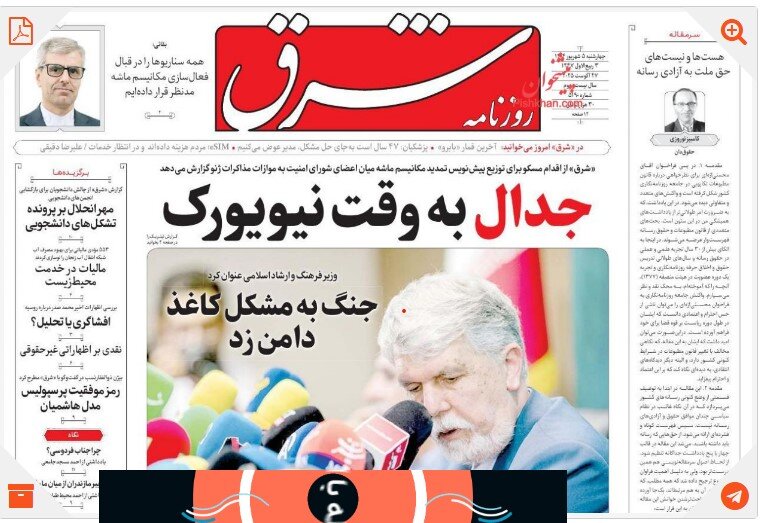Talks are at a sensitive and fragile stage

TEHRAN - Shargh analyzed the Geneva meeting between the Iranian and European diplomats as the E3 (Britain, France and Germany) has threatened to activate the snapback mechanism that would return all UN sanctions against Iran lifted under the defunct 2015 nuclear deal called the JCPOA. It wrote: The second round of talks was held in a situation where the regional and international atmosphere is still under the shadow of the June attacks by the Zionist regime and the open support of the United States for it (the 12-day war).
Such an atmosphere naturally makes it more difficult to reach an understanding. However, Tehran emphasizes that the solution lies in dialogue. It seems that the parties are cautiously assessing the situation and preparing for the next stages. What is certain is that this round of talks neither reached an endpoint nor opened a new path. In such circumstances, one can only say that the diplomatic path is still open, but its fate will depend on the will and choice of the European parties and, of course, on the political developments in the coming weeks. The release of no statement, a caution by the parties to express their positions, and Iran's emphasis on giving diplomacy a chance all show that the talks are at a sensitive and fragile stage.
Etemad: An opportunity to contain snapback
In an interview with Morteza Makki, an expert on European affairs, Etemad examined the possibility of a serious resumption of dialogue between Europe and Iran as the European side has threatened to invoke the snapback mechanism by the end of August. Makki said: The Iranian nuclear issue has now become a serious challenge for European governments. In recent weeks, the Israeli lobby has also been active in Tel Aviv and Washington. It has sought not to miss the opportunity to push for the activation of the snapback mechanism. However, there are still doubts among European governments about invoking snapback mechanism, because they know that if the JCPOA is considered effectively over, they will lose their role in the Iranian nuclear issue. Iran, as an influential player in the region, is trying to prevent activation of the snapback in the remaining time, because the country’s current conditions cannot tolerate the return of Security Council sanctions. If the Europeans send a letter to the Security Council to begin the process of activating the snapback mechanism, Iran has a one-month time to propose effective solutions to prevent it. In the meantime, the upcoming visit of our country's President, Masoud Pezeshkian, to New York could be a golden opportunity to prevent the activation of the snapback mechanism.
Khorasan: Scenarios on negotiation table, postponement or activation?!
Khorasan spoke with Rahman Ghahremanpour, a foreign policy analyst, about the new round of talks between Iran, three European countries of Britain, France and Germany), and the larger European Union in Geneva. He said: A new round of talks between Iran, three European countries, and the European Union has begun in Geneva; negotiations that officials are presenting as a new opportunity to chart the course of diplomatic relations between Tehran and the West. There are two main views on the future of the snapback mechanism. Some consider it a costly threat that should be postponed by diplomatic means; others believe that postponement will only increase costs and that its purpose should be clarified as soon as possible. Extending or postponing the snapback mechanism is in the interests of both the Europeans and Iran, because Europe continues to maintain its role in the nuclear file, Iran will gain more time to build domestic consensus, and the United States will also benefit from psychological pressure. Although postponement is not a complete solution, it can reduce the intensity of tensions in the current situation.
Arman-e-Emrooz: Economic diplomacy is government's winning card
Arman-e-Emrooz argued the successes of the sitting government's economic diplomacy were the result of several key factors. First, strategic use of Iran's geopolitical position as a connecting route between the East and the West. Second, establishment of mutually beneficial economic relations, which won the trust of foreign partners. Third, coordination between executive agencies, including the Ministry of Foreign Affairs and the Ministry of Economy, accelerated implementation of projects. Fourth, adoption of decision in line with the FATF, which acted as a catalyst for trade facilitation. This integrated approach made Iran a key player in the regional economy. These achievements had widespread effects on the Iranian economy. Rise in non-oil exports to Arab and Eurasian countries led to an improvement in trade balance. Foreign investments, especially from China, strengthened industrial infrastructure and created sustainable employment. The expansion of transit corridors and the removal of FATF obstacles increased foreign exchange earnings and made the Iranian economy more resilient to external pressure. These developments also strengthened public confidence in government policies.
